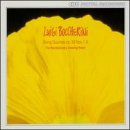| All Artists: Luigi Boccherini, Graham Cracknell, Revolutionary Drawing Room Title: Boccherini: String Quartets, Op. 58, Nos. 1-6 Members Wishing: 0 Total Copies: 0 Label: Cpo Records Release Date: 7/26/1994 Genre: Classical Styles: Chamber Music, Historical Periods, Classical (c.1770-1830) Number of Discs: 2 SwapaCD Credits: 2 UPC: 761203907021 |
Search - Luigi Boccherini, Graham Cracknell, Revolutionary Drawing Room :: Boccherini: String Quartets, Op. 58, Nos. 1-6
 | Luigi Boccherini, Graham Cracknell, Revolutionary Drawing Room Boccherini: String Quartets, Op. 58, Nos. 1-6 Genre: Classical
|
Larger Image |
CD Details |
CD ReviewsHow a great person acts when no one is looking! Nathan P. Cook | 10/15/2008 (5 out of 5 stars) "The best way for me to review these works is for me to place them in the context of the composer's work as a whole. Boccherini (1743 - 1805) started off as a celebrated cello virtuoso (12 concertos [though there is evidence of a lost double concerto for two cellos]) and ended up composing over 500 works, mostly for chamber ensembles. If you listen to any of these, even from his start, it is very evident that while he wrote inside the conventions of his day, his music has a very free and un-self-conscious spirit. He was an absolute musical individualist in this regard. These quartets were written late in his life when his reputation had long since been firmly established, thus these evidence no real concern for "proving" himself to his public. Rather, they flow freely from inside without any care that he might look "silly" or "unrefined." So here is the crossroads: are you the kind of listener who demands the perfection of convention, or do you value individuality even at the cost of strict professionalism?
The first quartet starts off as proof of my point. Its allegro is beautiful, though its themes are utterly carefree in their gusto. If you hear it and think "okay, well I'm glad he's being himself, but. . ." then the following larghetto will disarm you. Remember here that Boccherini was primarily a melodist (versus a "structuralist") and if this melody doesn't absolutely melt you, check your pulse. The next quartet is a bit more formal, at least as it starts off in its reservedness, hiding its unabashed celebration for its finale allegro vivo assai. Now this, ladies and gentlemen, is a wonderful, thoughtful, well-done and really quite fun exploration of a theme that should be instantly familiar to you (recall that Mozart wrote twelve variations on it as well!). No I won't tell you what the theme is! The fourth starts off with a wonderfully aggressive "strum of a drang" though, darn it, Boccherini lets the vigor out of it and turns it to sweetness, letting you know that he's not really serious about it. Here is one area where I fault him; he never really had a firm grasp on "strum und drang" (storm and stress). So if the first phrase puts you in a mood to expect a stormy work, you will be quite disappointed. However, if you can get by that and view the work as an eclectic piece, then it's really quite interesting and well-done. The andantino is quite noble and a bit classy and its rondeau returns that same vigor that you found in its opening movement. Overall, if I had a bone to pick with Boccherini I would prefer that he actually add a bit of self-consciousness to some of these works as the last one seems a bit tossed-off in its outer movements. In all, The Revolutionary Drawing Room plays these pieces perfectly. I find no fault with their performance in any way and can only praise it, though they lack the "living - breathing" qualities of, say, Europa Galante. Also, the sound is very clear and not at all muddled or blurred." |

 Track Listings (10) - Disc #1
Track Listings (10) - Disc #1